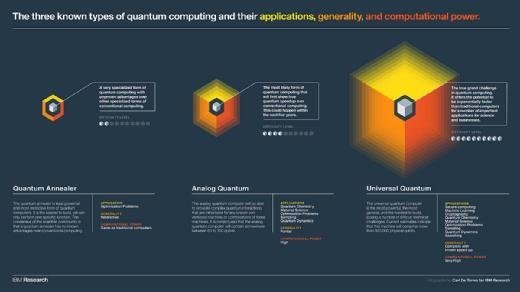
IBM develops quantum as a service
IBM starts the ball rolling on what it would mean to program a universal quantum computer
IBM’s Zurich Laboratory has made its five-bit quantum computer available to researchers through a cloud service.
The researchers at IBM have created a quantum processor, made up of five superconducting quantum bits (qubits).
IBM said users will be able to access the technology with a desktop or mobile device through a cloud-enabled quantum computing platform.
Although a universal quantum computer does not yet exist, IBM said its IBM Quantum Experience cloud service enables users to run algorithms and experiments on its five qubit quantum processor.
It said researchers will be able to work with the individual qubits, and explore tutorials and simulations around what might be possible with quantum computing.
“It is a beautiful challenge to pursue the path to build the first universal quantum computer, but it requires us to change how we think about the world,” said Dario Gil, vice-president of science and solutions at IBM Research.
“Access to early quantum computing prototypes will be key in imagining and developing future applications. If you want to understand what a true quantum computer will do for you and how it works, this is the place to do it. You won’t experience it anywhere else.”
IBM predicted that a medium-sized universal quantum processors of 50-100 qubits would be possible in the next decade. Such a computer could potentially be exponentially faster than traditional computer systems, IBM claimed.
But even the fastest supercomputers today are unable to emulate a 50 qubit universal quantum computer today.

“Quantum computers are very different from today’s computers, not only in what they look like and are made of, but more importantly in what they can do,” said Arvind Krishna, senior vice-president and director at IBM Research.
“Quantum computing is becoming a reality. It will extend computation far beyond what is imaginable with today’s computers. This moment represents the birth of quantum cloud computing.
“By giving hands-on access to IBM’s experimental quantum systems, the IBM Quantum Experience will make it easier for researchers and the scientific community to accelerate innovations in the quantum field, and help discover new applications for this technology.”
Quantum computing 101
Unlike a traditional computer, which makes use of bits to process information, where each bit represents either a one or a zero, a qubit in a quantum computer can represent a one, a zero, or both at once. This is known as superposition.
This property, along with other quantum effects, enable quantum computers to perform certain calculations vastly faster than is possible with classical computers.
With Moore’s Law running out of steam, quantum computing will be among the technologies that could usher in a new era of innovation across industries.
This leap forward in computing could lead to the discovery of new pharmaceutical drugs and completely safeguard cloud computing systems. It could also unlock new facets of artificial intelligence (which could lead to future, more powerful Watson technologies), develop new materials science to transform industries, and search large volumes of big data.











